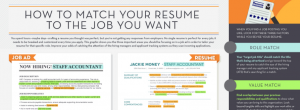
Click here for a nice infographic about tailoring your resume to meet the job description. Source: Career Builder
Résumés
In this class, each student will develop, revise, and submit both a one page cover letter applying for a (real) job posting, as well as a personal resume tailored to fit that specific job posting. I suggest highlighting the most impressive aspects of your education and previous employment experience, and tailoring the presentation of your personal and professional qualities in order to fit the job description. Model résumés and cover letters will be provided. This short document will provide the minimum critical specifications for your résumé.
What is a résumé?
According to Dictionary.com, résumé means “summary” or “summing up.” They provide the following definition: “a brief written account of personal, educational, and professional qualifications and experience, as that prepared by an applicant for a job.”
For the purpose of this class, the résumé is a list of your jobs, volunteer and educational experience. It should be attractively presented, easy to read and clear. Traditionally, the résumé is a staid, gimmick-free document, so don’t bother with fancy paper or elaborate design (unless, perhaps, you are looking for a graphic design job.)
There are actually many ways of doing a résumé and I don’t want to over-specify the requirements. That said, here are some non-negotiable rules:
- The résumé must be entirely free of any spelling, punctuation or grammatical errors
- The résumé must be entirely factual, with no fabricated entries
- The résumé shouldn’t be any longer than one page
- List experience in “reverse chronology” (most recent experiences first).
Beyond that, I do also have some advice that is strongly recommended:
- Be specific
- Provide concrete examples to illustrate
- Show us what you mean, don’t just tell
- Reconsider overused clichés
Usually the résumés I read are too vague and general. Wherever possible, take to opportunity to emphasize your strengths and outstanding characteristics. Give specifics to help the reader picture exactly what they can put you to work doing. If you make a claim about yourself, provide some type of evidence (examples) to back them up. Instead of telling us that you are “a motivated self-starter,” for example, think of a time that you took an initiative on the job that improved work flow, boosted morale or improved sales.
Now that you have some ground rules and suggestions, go to work. This process should be a back and forth between us, always improving on the last draft. I warn you that, while I always try to be decent, your resumes and cover letter will undergo considerable scrutiny.
Within one short page, there are still plenty of ways to get creative with the presentation. Will you include a goals statement? Will you lead with your education, or employment? What about volunteer positions you have had? Internships?
You can make your previous experience sound more interesting without ever making things up. So you were a bagger at Key Food? Well look at how we might present this work experience:
Key Food, 102 Fulton Ave, Brooklyn NY (April 2012 to August 2013).
- Bagger at the busiest grocery store in Crown Heights
- Provided warm, friendly customer service to an average of 50 customers per shift
- Assisted sales clerk with over $50K in sales
- Adapted to, and thrived in, a busy, hectic environment
I have tried to present bagging as a heroic form of acrobatics, bringing in the big bucks and serving the community.
Don’t take my word for it. The World Wide Web is full of articles with advice about how to market yourself. Click on these links for more ideas and inspiration:
Want An Unbeatable Resume? Read These Tips From A Top Recruiter (Forbes)
How to Write a Résumé That Stands Out (Harvard Business Review)
Resumes (Harvard Law School)
The 41 Best Resume Templates Ever (The Muse)
Basic Resumes and CVs (Columbia Center for Career Education)
Write a resume that generates results (Rockport Institute)
Resumes that Work (Wellesley College)
Writing Your Resume (University of Denver)
How to Write a Healthcare Resume (Live Career)
Resume Tips for Healthcare Professionals (Monster)
Medical Resume Examples (Resume Resource)
Engineering Resume Samples (Cal Poly)
Resumes and Cover Letters (Cornell Engineering)
Electrical Engineer Resumes (Resume Genius)
Construction Worker Resume Samples (Live Career)
Hospitality Manager Resumes (Job Hero)
Hotel manager resume (Career FAQs)
Tips to consider for an informatics resume (Nursing Informatics)
Computer Repair Technician Resume Example (Live Career)
I came up with this partial list by googling “resumes” and other key words. You can do it too! Click here.
[To get this assignment, above, as a word document, click here.]



